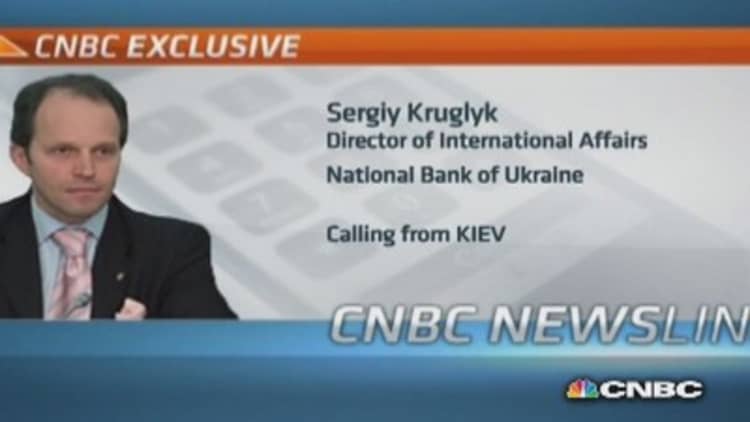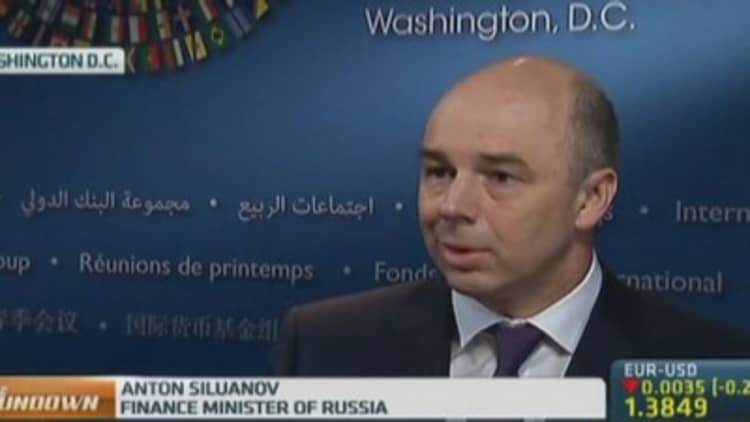Russia is going to great lengths to try to reassure investors, foreign businesses and its own people about its economic and political stability. But in the midst of escalating violence in Ukraine and huge capital outflows, Russia has already dug itself a deep economic hole—and it's getting worse.
On Thursday, with U.S. Secretary of State John Kerry threatening increased economic sanctions against Russia if it escalates the situation in Ukraine, Russian Foreign Minister Sergey Lavrov said that all parties involved—including the U.S. and European Union—have agreed to cut back tensions.
The Russian rouble firmed against the U.S. dollar on that news Thursday, and U.S. 10-year Treasurys rose to sessions highs.
A quick look at Russia's largely state-controlled media reports this week indicates that the Kremlin wants, at the very least, to give an appearance of political normalcy and economic stability. One headline in a major Russian newspaper, for instance, read "Crisis in Ukraine will not become an obstacle for foreign pharmaceutical companies operating in Russia."
Read More
The focus of the story was to reassure the public that current political turmoil would not affect Western European companies like Boehringer Ingelheim and Bayer MaterialScience, two German firms mentioned in the article.
"For a company, economic and political stability is important ... but we've been working in Russia for a while now," the story quoted a Boehringer Ingelheim executive as saying. "Russia is a very important market for us ... and we continue to utilize the same strategy and we don't intend on changing it depending on the political situation."
That newspaper said Bayer MaterialScience echoed those sentiments and reiterated that the company will continue its work in Russia, and will even look to expand in some areas.

Russia is in the midst of a serious bout of capital flight. The country's capital outflows so far this year have surpassed their total for all of 2013. Russian Economy Minister Alexei Ulyukayev admitted this week to the growing issue of capital flight, which experts say will only get worse.
Alexander Kliment, director of Russia and EM research at Eurasia Group, told CNBC that even before the crisis in Ukraine, Russia was teetering on the brink of recession because of limited foreign direct investment.
"The Ukraine crisis has exacerbated that trend," he said. "When firms and funds see flat growth, high geopolitical risk and the prospect of more Western sanctions, it makes them want to pull their money out. When risk rises, the money flees."
Read MoreRussia's economy feels the sting of Ukraine crisis
Ed Mermelstein, an attorney and adviser on cross-border investments in Russia, told CNBC that the flight phenomenon is interesting, especially since Russia is working very hard to repatriate funds.
"Most funds are going to new 'offshores' such as Singapore, Dubai and Malta. London is still very popular but there continues to be fear of Western locations," he said.

There are even indications that some of those funds that are fleeing Russia are heading to a perhaps counterintuitive destination: the United States.
Mermelstein said he continues to see Russia investments flowing into New York City and Miami, but now the funds are less likely to come directly from Russia, and more likely to flow through intermediary nations like Malta.
Stratfor Eurasia analyst Marc Lanthemann noted that GDP projections for this year are the worst for Russia since 2008, and he confirmed that the country is seeing a deluge of capital outflows because of its foreign confrontations.
The difference this time versus Russia's last major spate of capital outflows in 2008, however, is that crude oil prices remain stable now. That's crucial for the Russian economy, which has failed to diversify from energy production on any significant level.
Read MoreUkraine takes action to dislodge separatists
"The Kremlin relies on hydrocarbon export revenues to fund around 80 percent of its budget, and the resilience of oil prices gives Putin enough leeway to continue pursuing his geostrategic goals in Ukraine (integrating Crimea and maintaining a military posturing on the eastern border of Ukraine is by no means a cheap venture)," Lanthemann told CNBC via email.
Experts who spoke to CNBC agreed that the biggest risk for Russia right now is deeper economic sanctions from the West. Kliment said that so far, Vladimir Putin has prioritized geopolitical ambitions over economic considerations, which could further scare off potential investors.
"The existing sanctions are chiefly symbolic—they don't affect any key sectors or companies—but the threat of further sanctions is already complicating Russian firms' ability to attract fresh capital from abroad," Kliment said.
Deterred in Ukraine?

Stratfor believes that a Russian invasion of mainland Ukraine remains unlikely; however, Lanthemann said the Russians are going to be very careful in how they deal with the energy issue.
"Unlike the 'gas wars' of 2006 and 2009, Moscow will be very careful this time around not to mix energy and politics," Lanthemann said.
During a televised question-and-answer session in Russia on Thursday, however, Putin appeared to indicate that he was willing to cut off gas supplies to "our European consumers," though not immediately.
"We can cut it off right now. But we will wait another month," Putin said.
Finance Minister Anton Siluanov told CNBC last week that Russia will continue to improve its investment climate, and that big companies are operating business as usual. He did acknowledge a shift because of geopolitical risk, but said Russia would be able to increase the investment inflow into Russia.
Read MoreHere's what you need to know about Ukraine crisis
Robert Kahn, senior fellow at the Council on Foreign Relations, told CNBC that sanctions are important, even if the U.S. goes at it alone, "because payments are cleared and settled by institutions that have American ownership and participation."
He added, however, that there could be a significant cost for the U.S. as well. Russia has been quick to point out the same thing. Russian officials, including Foreign Minister Sergey Lavrov, have said that any U.S. and Western sanctions could have a boomerang effect and would negatively impact U.S. companies and people.
Kliment said that Russia can punish foreign and American companies if, in fact, there were further sanctions in the event of a Russian invasion.
"The Russian government would retaliate against Western firms in Russia, either with their own direct sanctions or, more likely, with regulatory harassment and discrimination in awarding contracts," Kliment told CNBC.
—By CNBC's Dina Gusovsky. CNBC's Ted Kemp contributed to this report.


